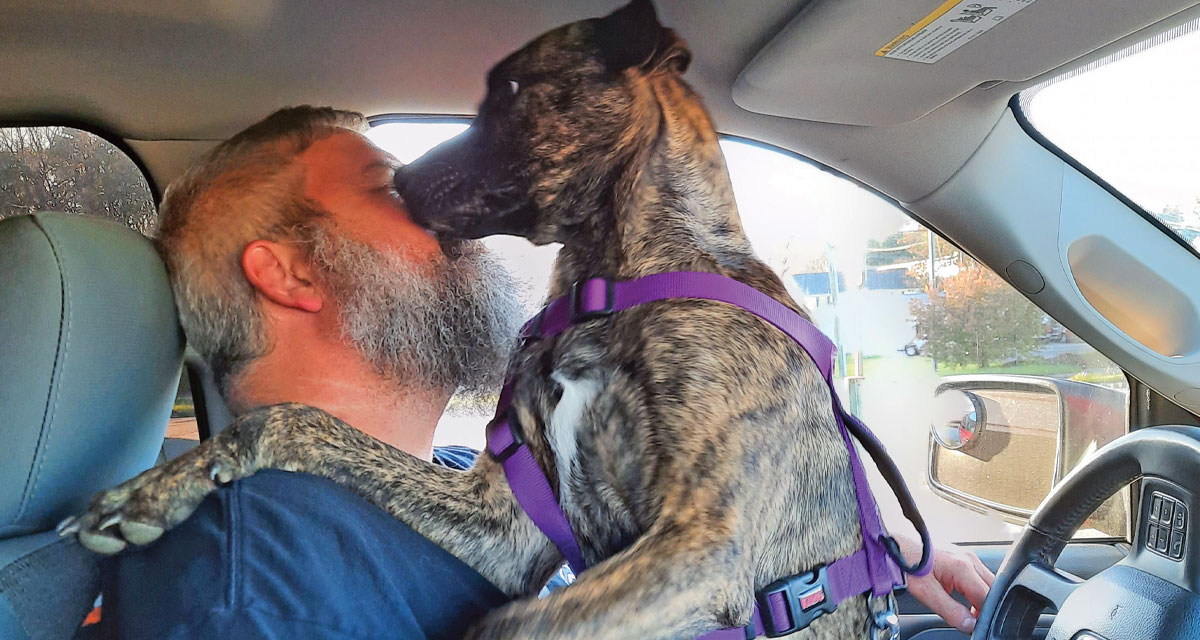In October of 2020, a malnourished mountain cur and plot hound puppy, estimated at 10-months-old, accepted the friendly call to approach a stranger on a city street in Mount Airy. The immediately affectionate brindle puppy was taken to Surry Animal Rescue to be medically checked and assessed for aggression. Within days, the puppy, named Zeke, arrived at a farm and found comfort in a foster family with acres of land and dogs. Within two weeks, Zeke received a request to meet his forever family.
The Response from Animal Lovers
Dogs and cats arrive weekly at animal shelters and rescue centers due to age, health, behavior, or the inability of owners to continue care. In cities and towns, concerned people stepped up during the response to Covid-19’s business site closures, starting in April 2020. Animal lovers called, sent e-mails, and filled out foster applications, willing to welcome some lucky person’s forever friend into their home and daily life. Within months, rescue centers and animal shelters became quickly alarmed. Almost every pet that went into the tender hands of a foster family applied for adoption. And, the need for new, approved applications increased!
Personal Experience
Dani writes, “The role of an animal foster parent allows you to get to know the true personality of an adoptable pet in a home setting, without stressing the animal by keeping him or her caged in a noisy environment. Most animals don’t act like themselves in a sheltered location. I enjoy meeting prospective families, giving them information about a dog or cat’s routine, and answering questions. When I see the excitement on each face I meet, I know I am an important part of the transition.”
Are You Ready?
Ask yourself a few questions before applying to be an animal foster parent.
- Are your pets welcoming to new animals? If you have an alpha female or male, you may request a specific sex or size. Just remember, dogs that regularly have the opportunity to socialize and meet other breeds tend to handle stress and strangers with ease.
Decide whether you are interested in a specific breed, such as a golden retriever, or if you want to help all breeds. Would you consider fostering ferrets, rabbits, hamsters, or parrots? The answer will determine what type of rescue agency you chose to contact.
- Can your home accommodate small animals, such as kittens and puppies, or large animals like a German shepherd or Great Dane? Keep in mind small dogs, puppies, and kittens are often in demand and have a quick time- frame of adoption.
- Do you have flexibility in your schedule to accommodate extra responsibilities, such as vet appointments and meeting families?
Eliminating Excuses
Michael and Susan Johnson thought they were too busy to become animal foster parents. Susan writes, “We have three dogs and two cats, full-time jobs working from home, and three children. Our plates are full, but there are no excuses when it comes to helping animals. We always have the space for one more. As a family, we help establish routines, become accustomed to strangers, and learn social skills. Most often, fostering increases an animal’s chances of getting adopted. Our children are learning important lessons in the experience. It is truly a win-win for all!”
Reach Out
With abundant shelters and rescues near your home, it should be simple to find two or three who need foster parents by accessing a website and social media page to find additional information.
Most require:
- The primary caregiver to be at least 18 years old.
- Foster parents to live close to the shelter or rescue facility.
- That prospective fosterers have a room in the home, separate from other animals, to keep foster pets.
- That all pets in the home have updated examinations and vaccinations.
- Prospective foster parents to submit a background check form and online application.
- Prospective foster parents to complete a virtual training session, which includes program expectations and basic medical information.
After 35-plus opportunities, John Bartlett writes, “They fill our lives with glee as we take care of them until the day comes when we say goodbye—a day that is always bittersweet. For the first-time fosterer, they see if their heart and soul is strong enough to endure it again. If so, they start the process anew. For some, their heart couldn’t bear to part, and they adopt their fosters—we dub them “Failed Fosterers,” but there’s never any malice in it. We secretly wish we had as well!”



















